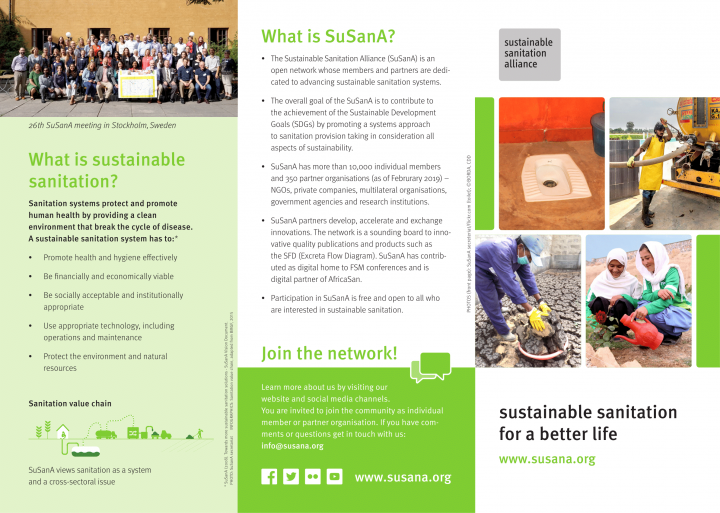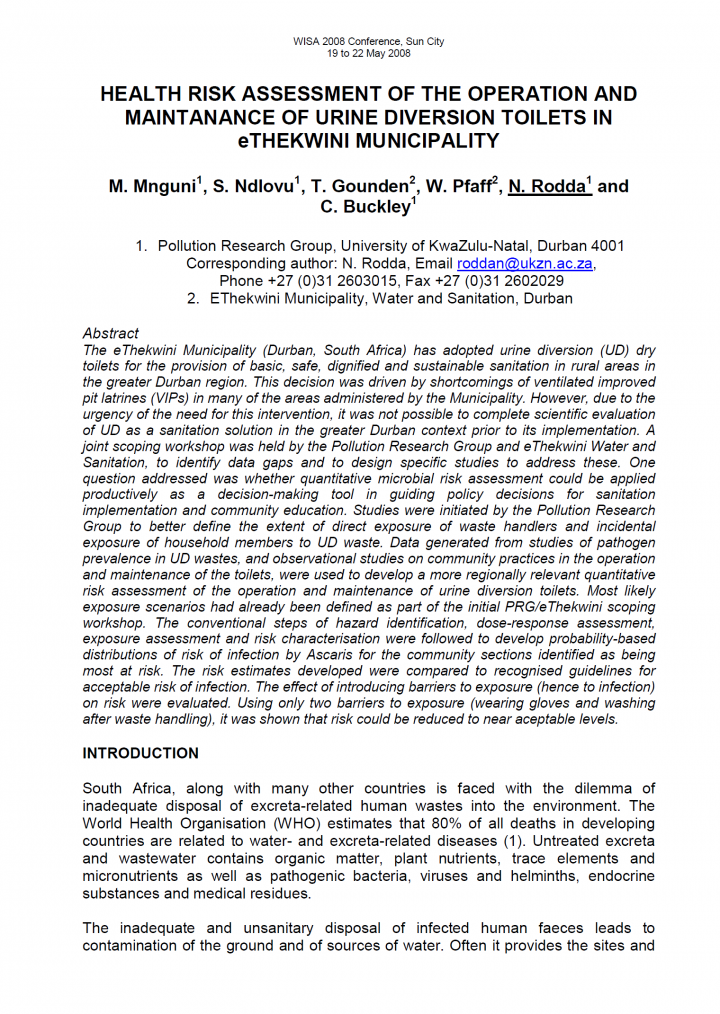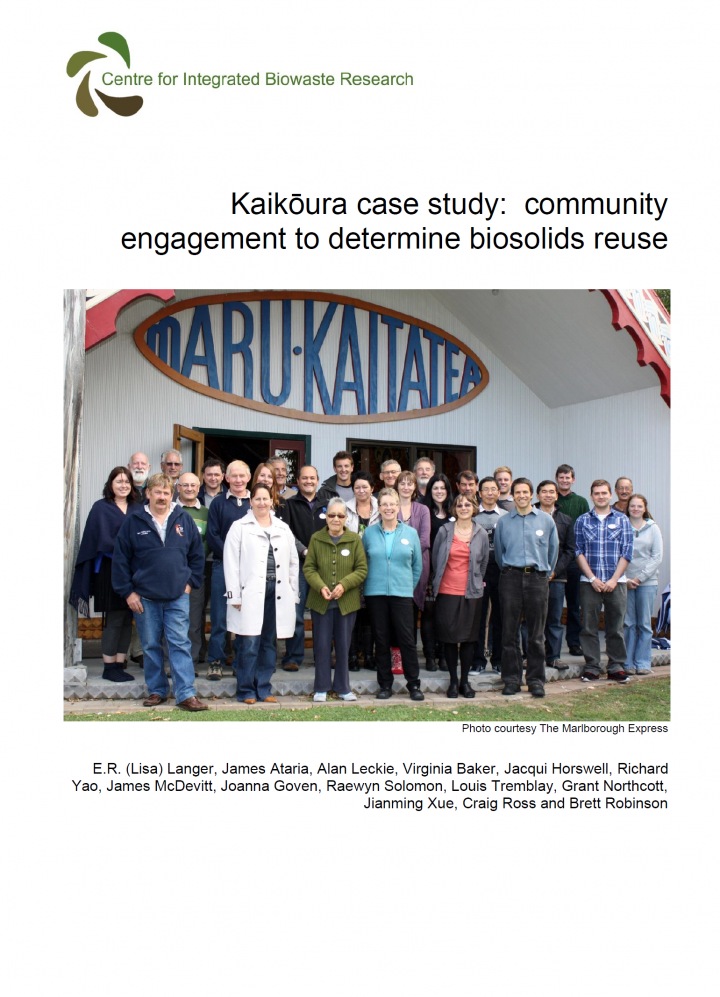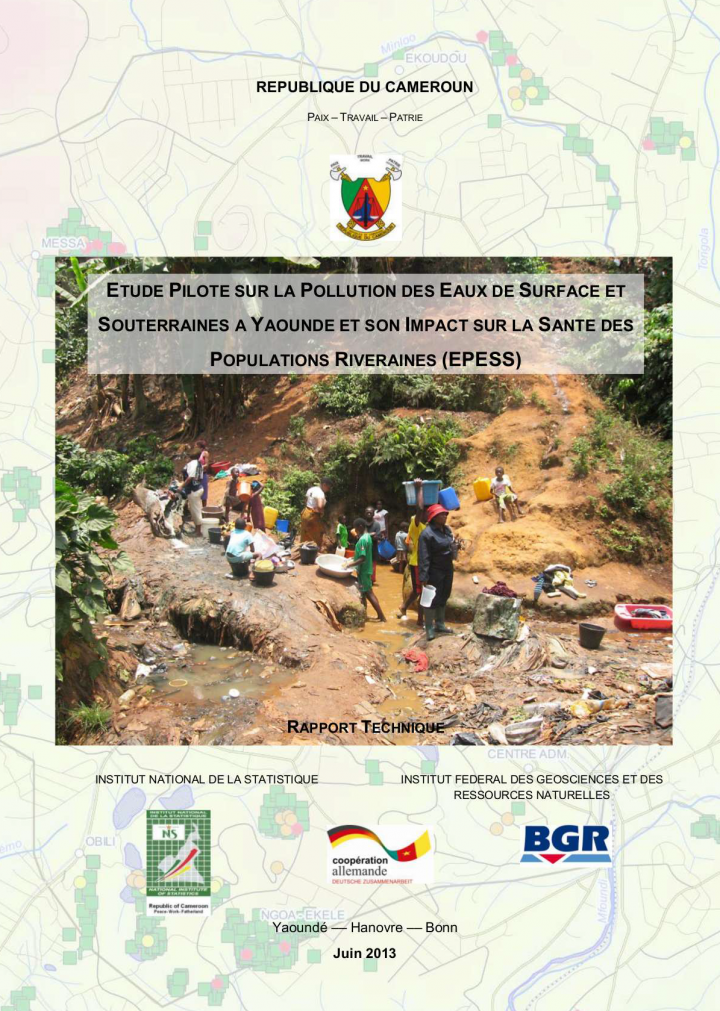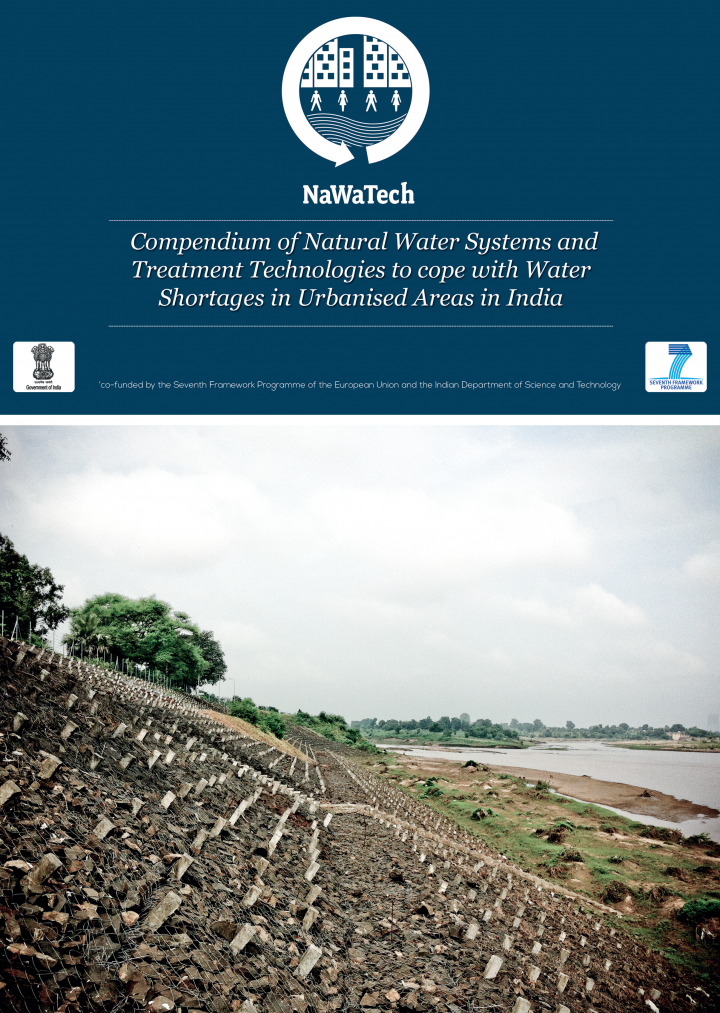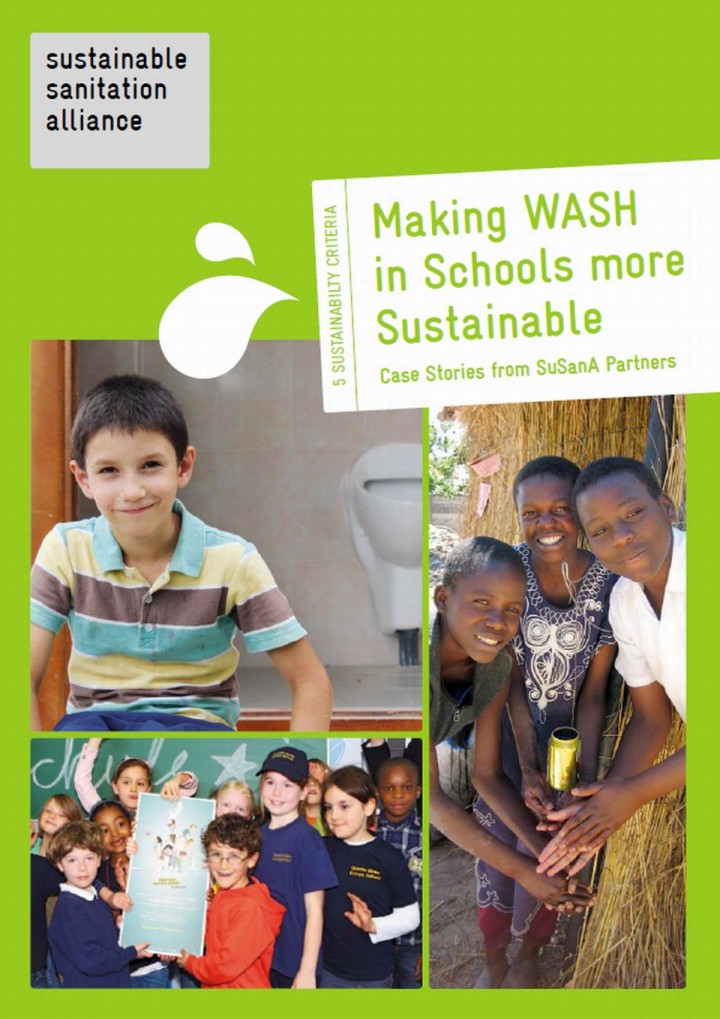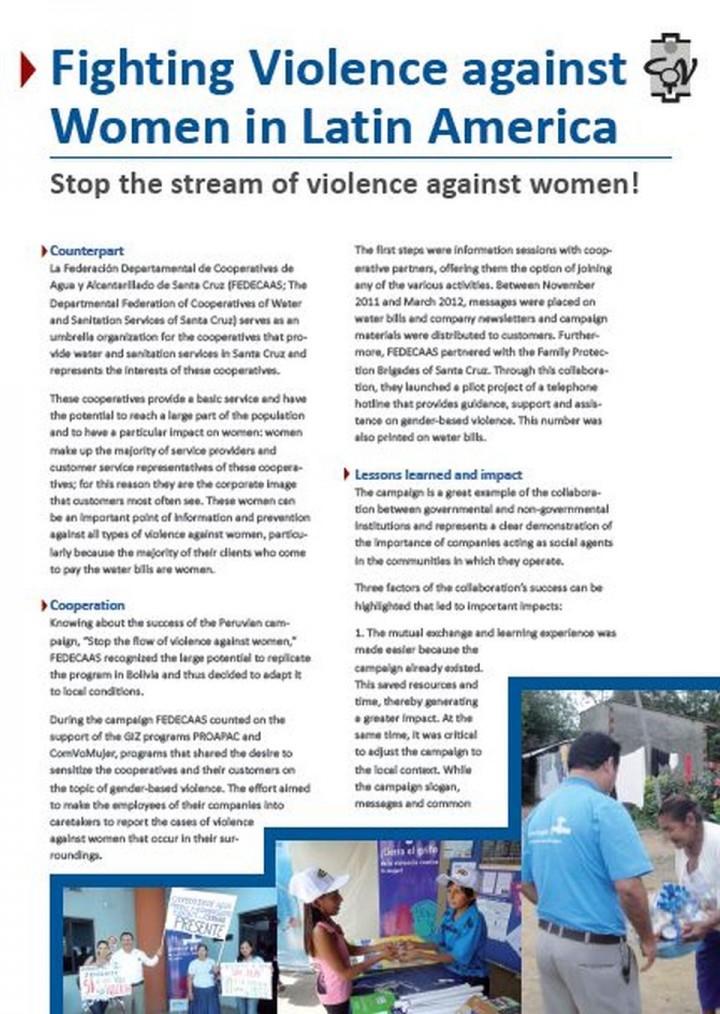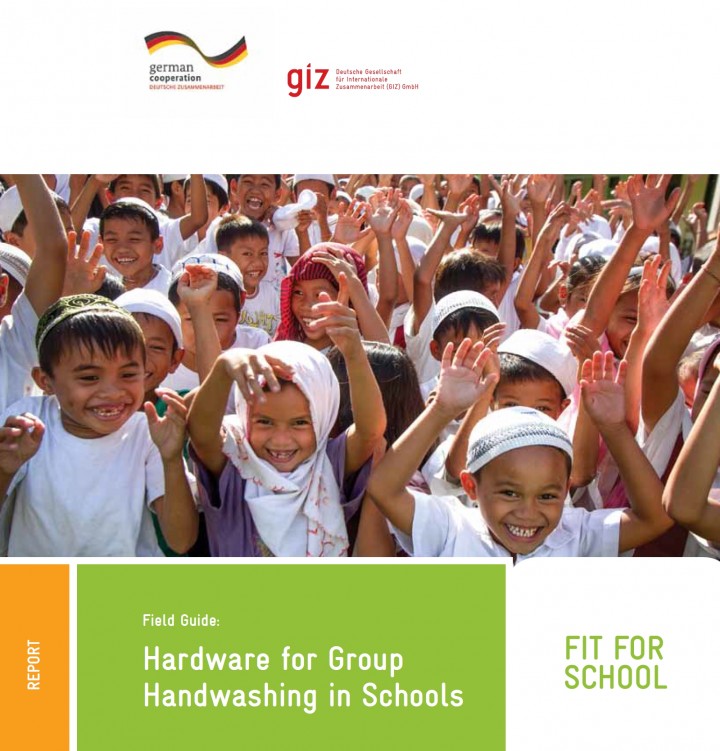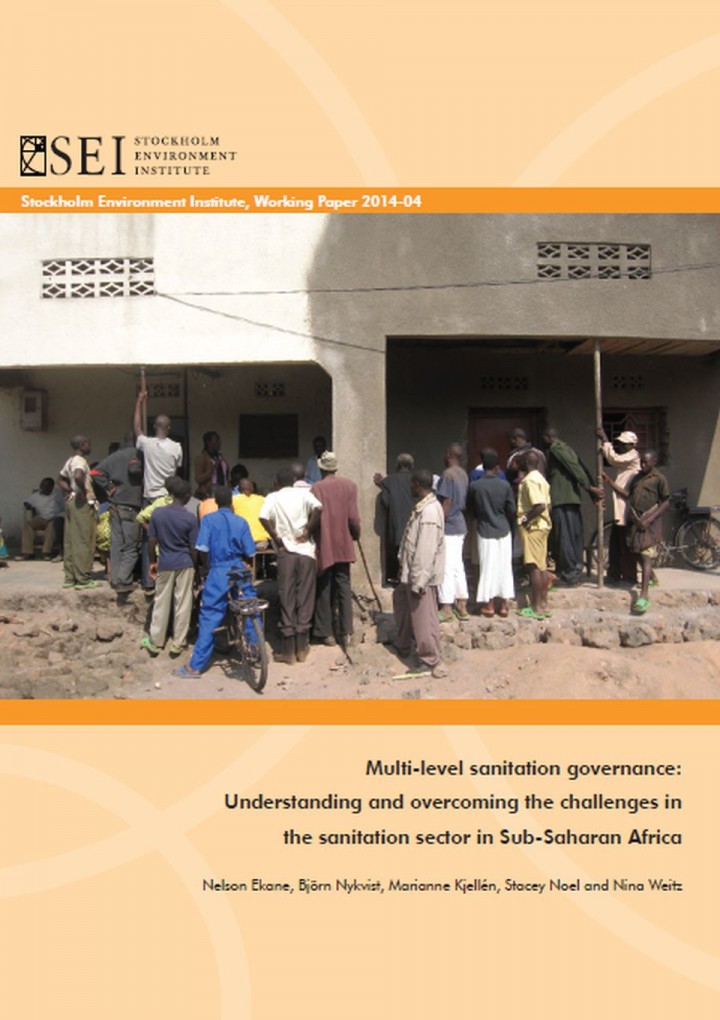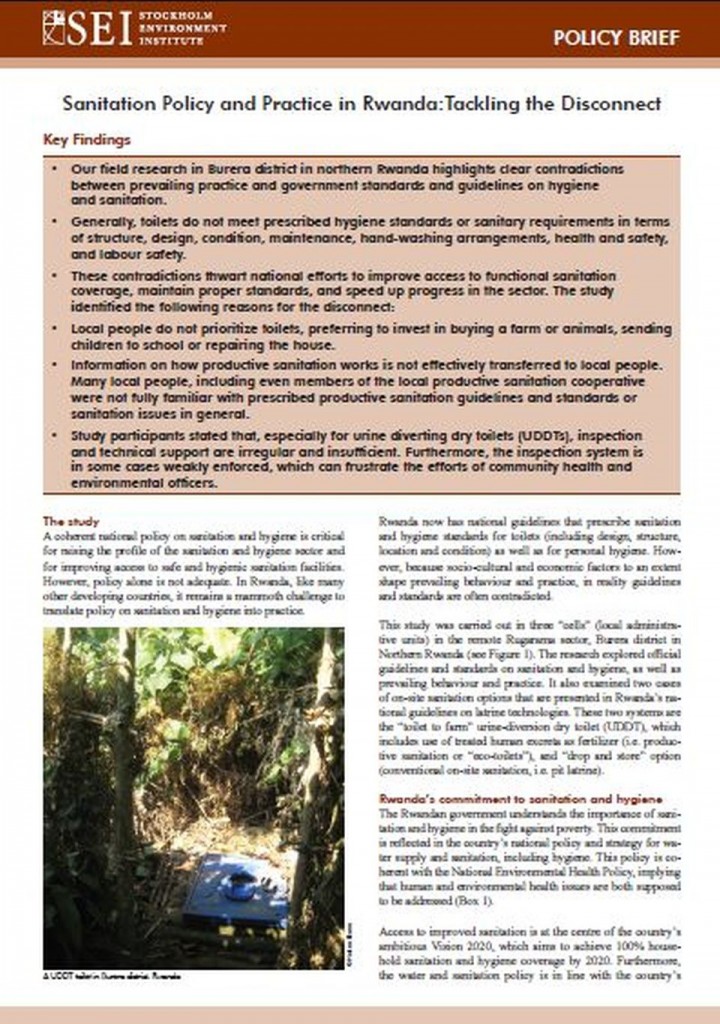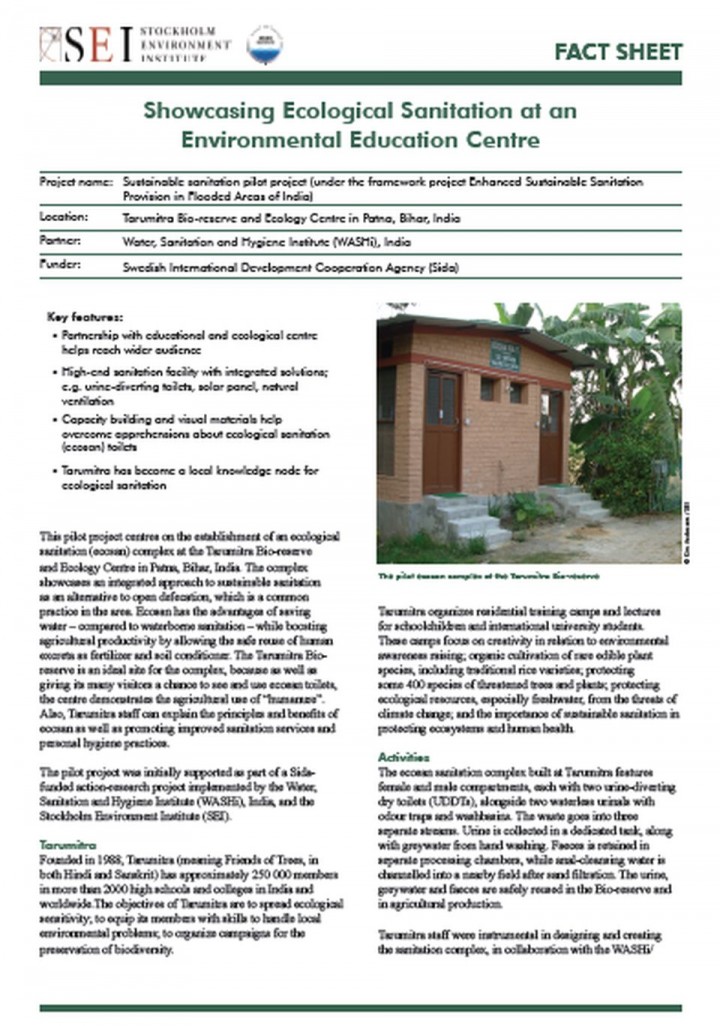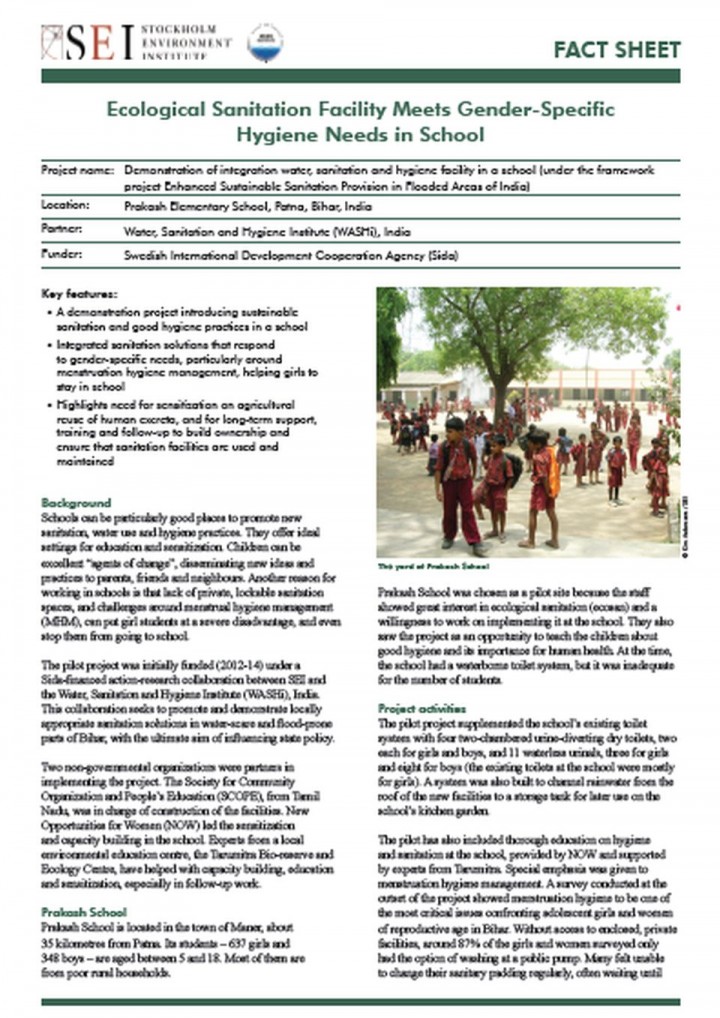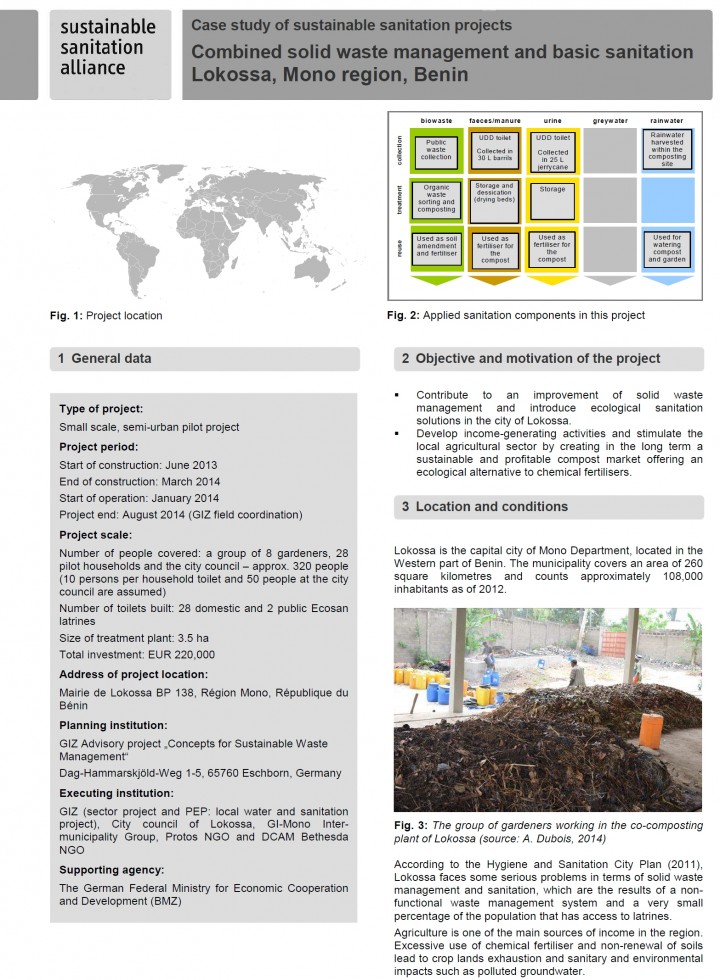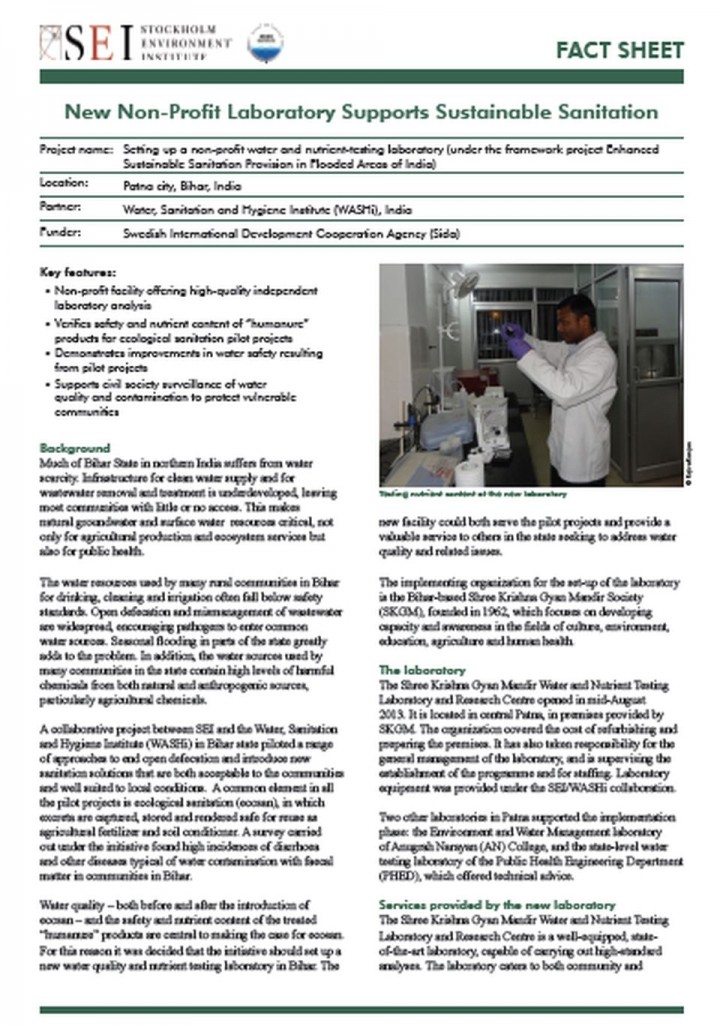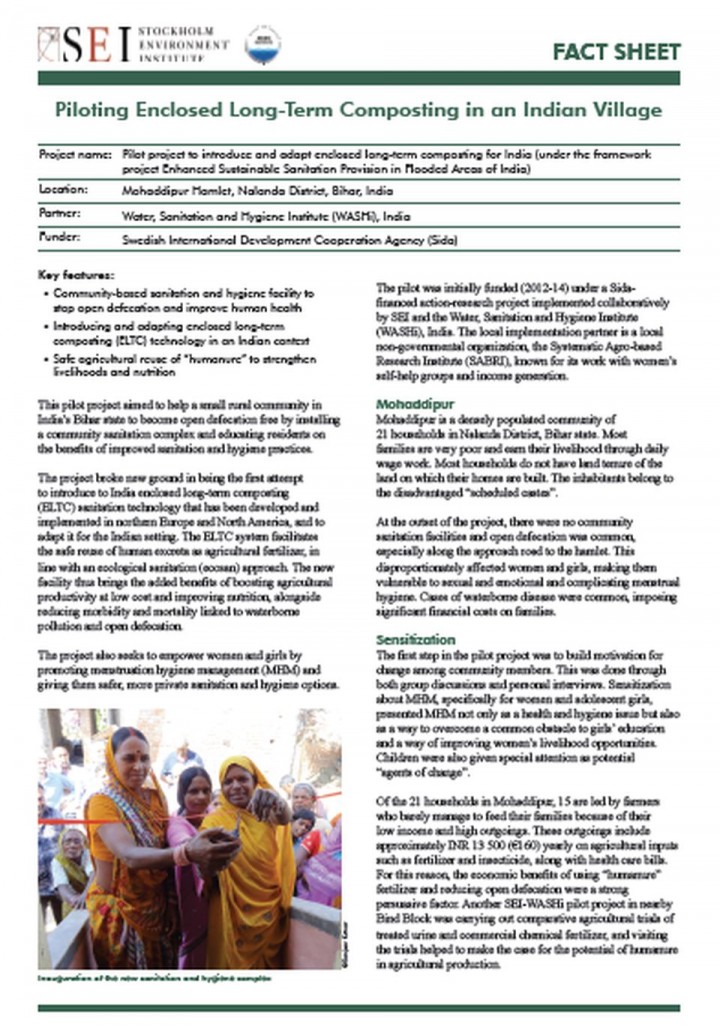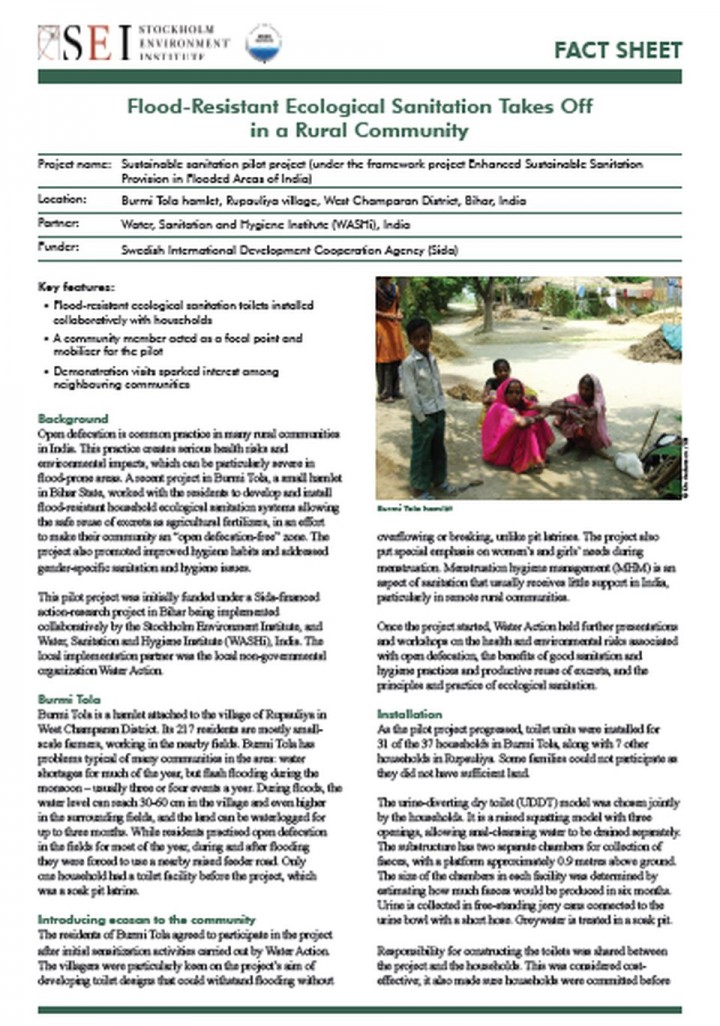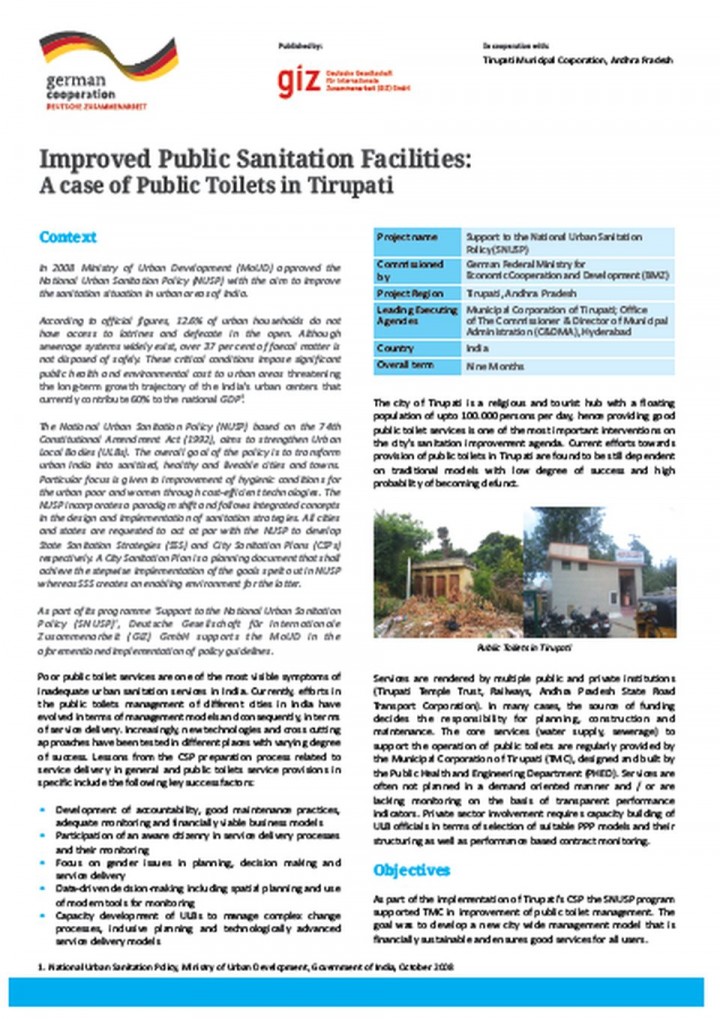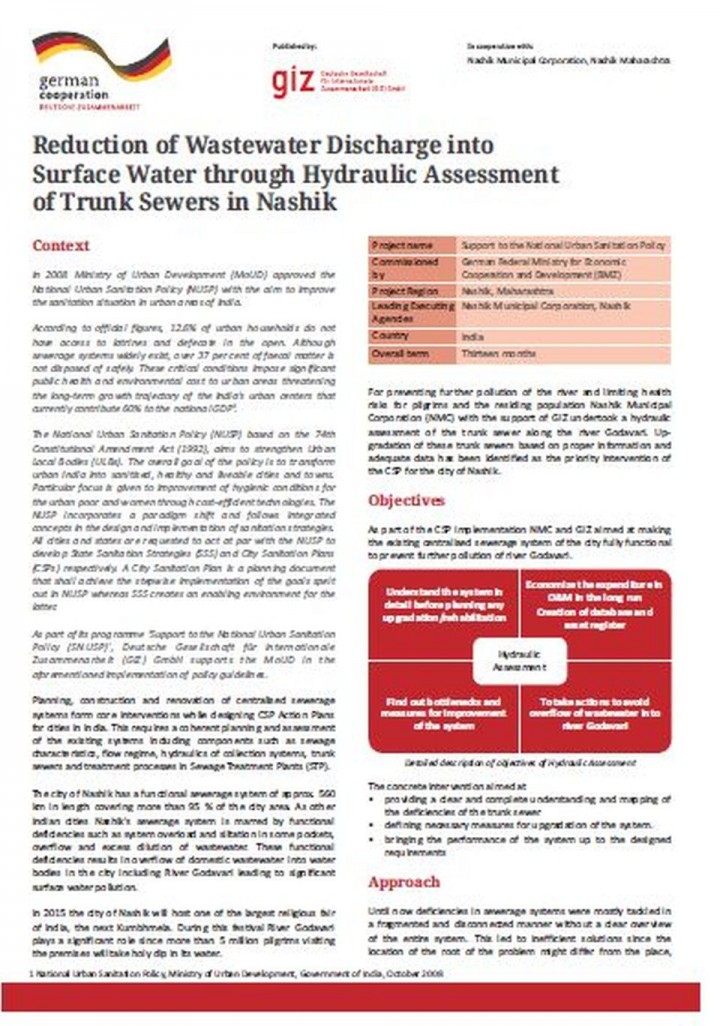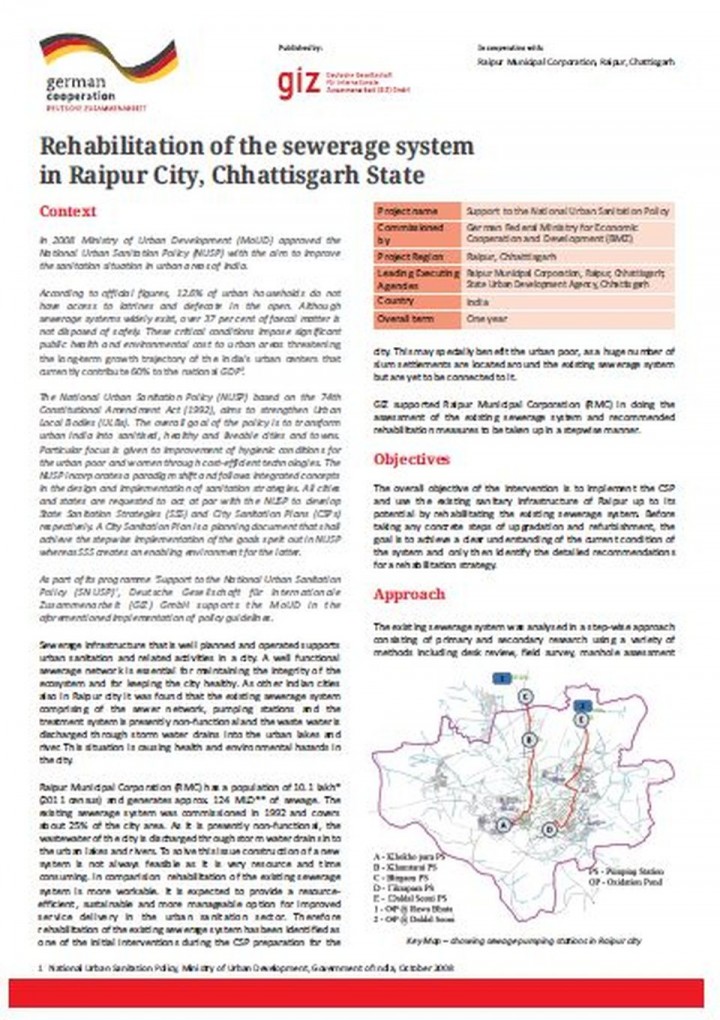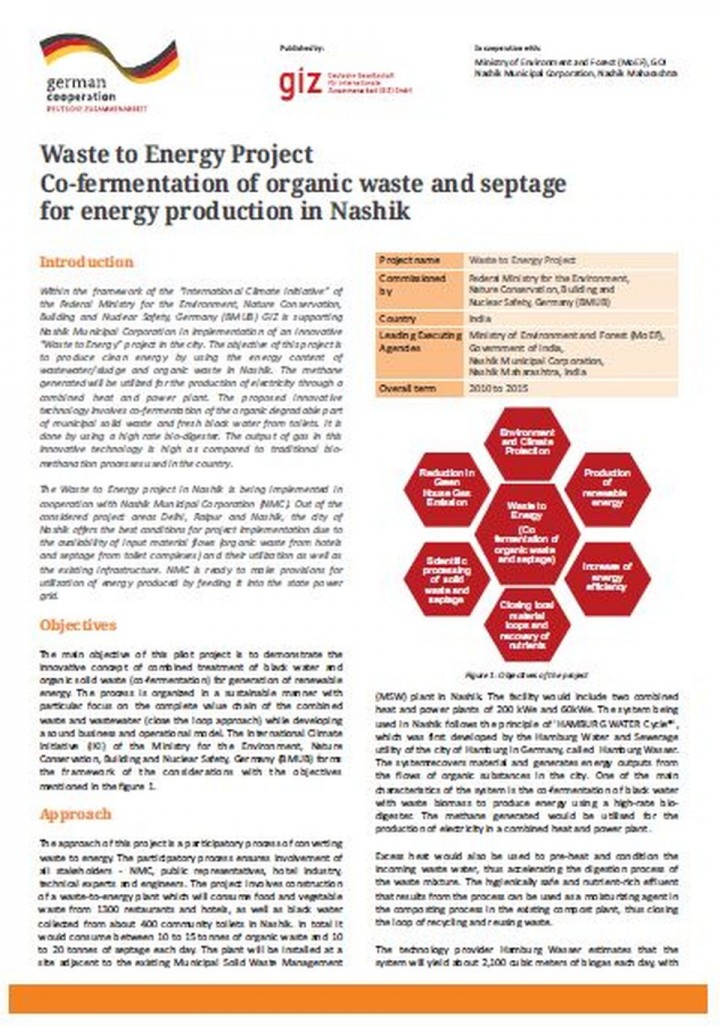SuSanA (2019) SuSanA Flyer - General overview of SuSanA on one page (in Arabic, English, French and Spanish)
This flyer gives a general overview of SuSanA, its objectives, working group topics, roles, discussion forum and funding. It needs to be printed on paper that is slightly larger than A4 so that it can be a folder in the "altar fold". There is a 2019 version of the flyer available in English and French, and a version from 2018 in Arabic and Spanish.
Mnguni M., Ndlovu S., Gounden T., Pfaff W., Rodda N. and Buckley C. (2008) Health Risk Assessment of the Operation and Maintenance of Urine Diversion Toilets in eThekwini Municipality
Langer L., Ataria J., Leckie A., BakerV.,Horswell J., Yao R., McDevitt J., Goven J., Solomon R., Tremblay L., Northcott G., Xue J., Ross C. and Robinson B. (2013) Kaikōura case study: community engagement to determine biosolids reuse
INS, Yaoundé, Cameroon and BGR, Hannover, Germany (2013) Etude Pilote Sur La Pollution Des Eaux De Surface Et Souterraines a Yaounde Et Son Impact Sur La Sante Des Populations Riveraines (in French)
This report (french version) is a joint WaSH-survey carried out in the subsaharan cameroonian capital Yaoundé in dry season 2012 within the framework of German bilateral cooperation with Cameroon. The report is authored by the National Institute of Statistics (NIS/INS) Yaoundé and the Federal Institute for Geosciences and Natural Resources (BGR) Hannover with participation of the IHPH University Bonn, the University of Yaoundé 1 and […]
Dillon, L. B. et al. (2013) Natural water systems and treatment technologies to cope with water shortages in urbanized areas in India NaWaTech Compendium of Technologies
Providing adequate water supply and sanitation, particularly in urban areas, is a challenging task for governments throughout the world. This task is made even more difficult due to predicted dramatic global changes. Population growth, urbanisation, increasing industrialisation, climate change and a steep increase in water consumption are putting pressure on urban water resources. In order to cope with water shortages in urban areas, there is […]
Wendland, C., Rieck, C., Roenitzsch, S., van Epps, A. (2014) Making WASH in Schools more sustainable Case Stories from SuSanA Partners
This publication showcases various approaches, both practical and innovative, to provide sustainable WASH solutions in schools around the world. The stories are not limited to the construction of water and sanitation systems but also show how these systems are operated and maintained through active involvement of pupils, teachers, cleaning staff and community members. In some cases, awareness is raised for the accountability of functioning WASH […]
GIZ (2012) Fighting violence against women in Latin America Stop the stream of violence against women (in English, German and Spanish)
Two-page factsheet, available in English, German and Spanish. The "Federación Departamental de Cooperativas de Agua y Alcantarillado de Santa Cruz" (FEDECAAS; The Departmental Federation of Cooperatives of Water and Sanitation Services of Santa Cruz) serves as an umbrella organization for the cooperatives that provide water and sanitation services in Santa Cruz and represents the interests of these cooperatives. During the campaign FEDECAAS counted on the support of the GIZ programs PROAPAC […]
GIZ Fit for School (2013) Field Guide: Hardware for Group Handwashing in Schools
Understanding that the school environment can enable development of healthy behaviors among children who may not have the same learning opportunity in their homes, schools serve as the center of development. Adapted from the experiences of Filipino NGO, Fit For Schools, this toolkit of effective handwashing tools promotes handwashing programs designed for schools and inspires a healthy learning environment by addressing approaches, common mistakes, and […]
Ekane, N. et al. (2014) Multi-level sanitation governance: Understanding and overcoming the challenges in the saniation sector in Sub-Saharan Africa Working paper
This paper uses analysis of multi-level governance, path dependency, and institutional inertia to help understand some of the challenges in the sanitation sector in sub-Saharan Africa, and discusses approaches for overcoming them.
Ekane, N. (2013) Sanitation policy and practice in Rwanda: Tackling the disconnect Policy brief
A coherent national policy on sanitation and hygiene is critical for raising the profile of the sanitation and hygiene sector and for improving access to safe and hygienic sanitation facilities. However, policy alone is not adequate. In Rwanda, like many other developing countries, it remains a mammoth challenge to translate policy on sanitation and hygiene into practice.
Andersson, K. (2014) Showcasing ecological sanitation at an environmental education centre Factsheet
This fact sheet describes how the Tarumitra Bio-reserve and Ecology Centre in Patna, northern India, is supporting a sustainable sanitation project through demonstration and education.
Andersson, K. (2014) Ecological sanitation facility meets gender-specific hygiene needs in school Factsheet
This fact sheet describes an attempt to promote health, hygiene and girls' access to education by installing a sustainable sanitation facility in a school outside Patna, northern India.
Dubois, A. (2014) Combined solid waste management and basic sanitation Lokossa, Mono region, Benin Case study of sustainable sanitation projects
This case study describes a combined waste management and sustainable sanitation project conducted by GIZ in Lokossa, Mono region, Benin. The project has been developed by the GIZ advisory project “Concepts for Sustainable Waste Management” in cooperation with the GIZ Water and Sanitation Programme (PEP) of Benin. Local partners include the municipality of Lokossa, the NGOs Protos, DCAM Bethesda and the municipal association GI-Mono.
Andersson, K. (2014) New non-profit laboratory supports sustainable sanitation Factsheet
This fact sheet describes the setting up of a new non-profit water- and nutrient-testing laboratory in Patna, India, to support a set of pilot projects promoting sustainable sanitation solutions in the state of Bihar and provide a valuable and unique service to the public.
Andersson, K. (2014) Piloting enclosed long-term composting in an Indian Village Factsheet
This fact sheet describes a pilot project that introduced enclosed long-term composting (ELTC) technology for the first time in the Indian context.
Andersson, K. (2014) Flood-resistant ecological sanitation takes off in a rural community Factsheet
This fact sheet describes a pilot project that supported construction of household ecological sanitation (ecosan) toilets specially adapted to be resistant to seasonal flooding, in a poor rural community in India's Bihar State.
Walther, D., Kanchi, N. (2014) Improved public sanitation facilities: A case of public toilets in Tirupati SNUSP II - Factsheet
The overall goal of the policy is to transform urban India into sanitised, healthy and liveable cities and towns. Particular focus is given to improvement of hygienic conditions for the urban poor and women through cost-efficient technologies.
Walther D., Yadav, J. (2014) Reduction of wastewater discharge into surface water through hydraulic assessment of trunk sewers in Nashik SNUSP II - Factsheet
The overall goal of the policy is to transform urban India into sanitised, healthy and liveable cities and towns. Particular focus is given to improvement of hygienic conditions for the urban poor and women through cost-efficient technologies.
Walther, D., Kanchi, N., Sharma, R. (2014) Rehabilitation of the sewerage system in Raipur City, Chhattisgarh State SNUSP II - Factsheet
The overall goal of the policy is to transform urban India into sanitised, healthy and liveable cities and towns. Particular focus is given to improvement of hygienic conditions for the urban poor and women through cost-efficient technologies.
Walther D., Yadav, J. (2014) Waste to energy project co-fermentation of organic waste and septage for energy production in Nashik SNUSP II - Factsheet
The approach of this project is a participatory process of converting waste to energy. The participatory process ensures involvement of all stakeholders - NMC, public representatives, hotel industry, technical experts and engineers.
